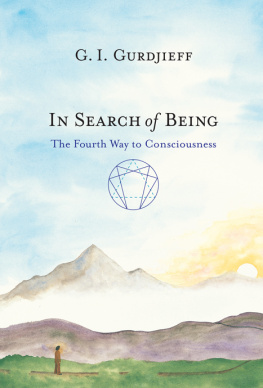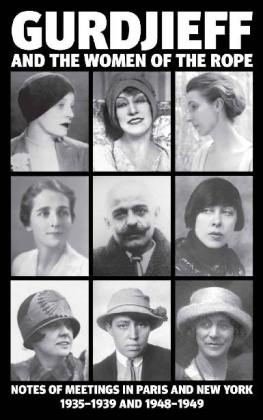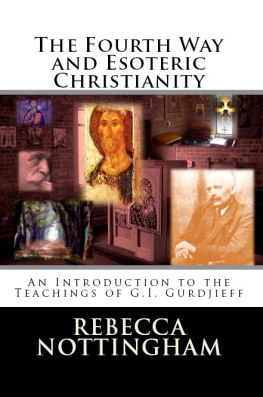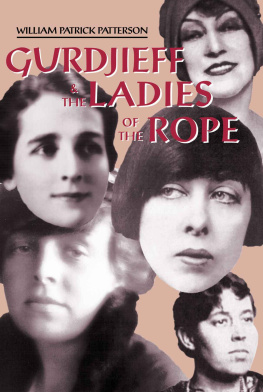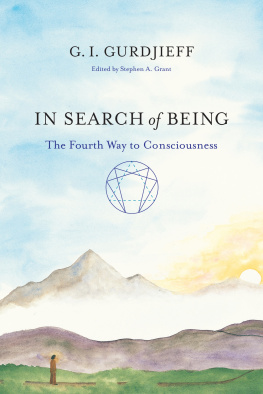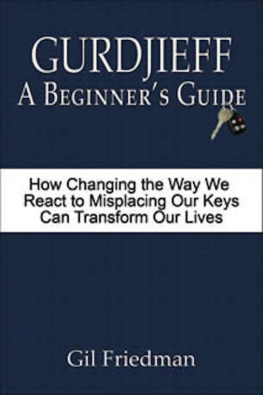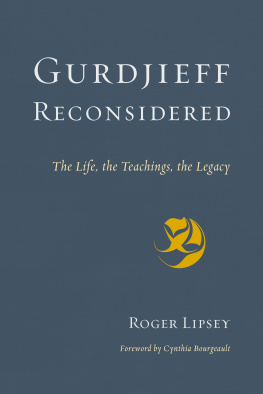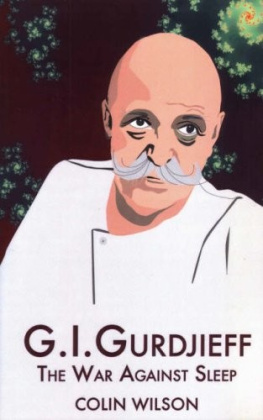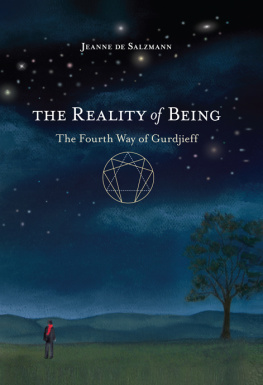ABOUT THE BOOK
Are we able to say that life is governed by a group of conscious people? Where are they? Who are they? We see exactly the opposite: that life is governed by those who are the least conscious, by those who are most asleep.
Provocative ideas such as these have attracted generations of thoughtful people to the methods of self-study and inner work devised by Gurdjieff, one of the most radical spiritual teachers of modern times. According to Gurdjieff, the wars raging at this very moment are nothing more than millions of sleeping people trying to annihilate millions of other sleeping people. Contrary to popular belief, there is no such as thing as progress and evolution as long as humanity remains asleep.
Two hundred conscious people could change the whole of life on the earth, Gurdjieff says. If we want to become those conscious people, we must learn how to change ourselves. With the help of self-knowledge and an understanding of our relation to the universe, we can awaken to a higher level of beingif we wish to change ourselves.
All of Gurdjieffs fundamental principles and methods of transforming the intellect, emotions, and body, in the system known as the Fourth Way, are presented in this book in his own clear, precise words preserved by his closest pupils.
Arranged in an orderly sequence of passages drawn from two primary source booksP. D. Ouspenskys In Search of the Miraculous, and Views from the Real World, edited by Mme. Jeanne de Salzmannthis material is an indispensable introduction for those determined to undertake the efforts and practices necessary for awakening consciousness.
All the basic concepts and methods are covered, including:
- man is asleep
- we have no unified I
- the need for self-knowledge
- functions of the human machine
- states of consciousness
- levels of being
- three centers: moving, emotional, and thinking
- personality and essence
- the possibility of self-development
- self-observation
- remembering oneself
- conscious evolution
- the law of three forces
- the ray of creation
- the law of octaves
- the Enneagram, a universal symbol
- the variety of spiritual ways
- esoteric Christianity
- working in groups
- the necessity of schools
G. I. GURDJIEFF (18661949) created an original system of self-transformation that reconciled the great mystical traditions, known as the Fourth Way or the Work. He initially gathered pupils in Moscow and in 1915 organized a study group in St. Petersburg that included P. D. Ouspensky, a leading figure in the spread of the teachings. Amid revolutionary turmoil in Russia, in 1917 he moved to the Caucasus and in 1922 established an institute for his work in France. The sources of the present book stem from this early period.
Sign up to learn more about our books and receive special offers from Shambhala Publications.

Or visit us online to sign up at shambhala.com/eshambhala.
IN SEARCH of BEING
The Fourth Way to Consciousness

G. I. Gurdjieff

SHAMBHALA
Boston & London
2012
Shambhala Publications, Inc.
Horticultural Hall
300 Massachusetts Avenue
Boston, Massachusetts 02115
www.shambhala.com
2012 by FourthWay Editions, Inc.
Edited by Stephen A. Grant, a senior member of the Gurdjieff Foundation, New York.
Cover art: The Road to Cold Mountain by Natasha de Castro.
All rights reserved. No part of this book may be reproduced in any form or by any means, electronic or mechanical, including photocopying, recording, or by any information storage and retrieval system, without permission in writing from the publisher.
Library of Congress Cataloging-in-Publication Data
Gurdjieff, Georges Ivanovitch, 18721949.
In search of being: the fourth way to consciousness / G.I. Gurdjieff.1st ed.
p. cm.
Includes bibliographical references and index.
eISBN 978-0-8348-2850-6
ISBN 978-1-61180-037-1 (hardcover: alk. paper)
1. Fourth Way (Occultism) 2. Self-consciousness (Awareness)
3. Awareness. I. Title.
BP605.G8I5 2012
197dc23
2012026373
Contents
ONE HUNDRED YEARS AGO in Russia, George Ivanovitch Gurdjieff (18661949) introduced an ancient teaching of mans conscious evolution, a forgotten science for perceiving reality in oneself and in the universe. Although he was virtually unknown during his lifetime, in the years after his death Gurdjieffs ideas have spread throughout the world, inspiring new generations of seekers to explore the esoteric meaning of traditional religions. Up to now, however, his early teaching has been reproduced only in fragments of talks from 1915 to 1924, arranged in chronological order; no attempt has been made to present this teaching in his own words as a comprehensive whole.
Gurdjieff regarded knowledge of realitywhat he called true knowledge of beingas a stream flowing from remote antiquity, passed down from age to age, from people to people, from race to race. He viewed this knowledge as the indispensable means to achieve inner liberation. For those seeking to understand the meaning of human life in the universe, he said, the aim of the search is to break through to this stream, to find it. Then there remains only to know in order to be. But in order to know, he taught, it is necessary to find out how to know.
Gurdjieff respected traditional paths toward spiritual transformation, and pointed out that their different approaches could be subsumed under one of three categories: the way of the fakir, which centers on mastery of the physical body; the way of the monk, based on faith and religious feeling; and the way of the yogi, which concentrates on developing the mind. He presented his teaching as a Fourth Way that requires work on all three aspects at the same time. Instead of obedience or faith, this way calls for knowing and understandingthe awakening of another intelligence. His personal wish, he once said, was to live and teach so that there should be a new conception of God in the world, a change in the very meaning of the word.
Born in 1866 in the Caucasus on the frontier of Russia and Turkey, from childhood Gurdjieff felt he had to understand the mystery of human existence, and delved deeply into religion and science to find some explanation. He found both approaches persuasive and consistent within themselves, but bound to reach contradictory conclusions, given the different premises from which they began. He became convinced that separately neither religion nor science could explain the meaning of human life. At the same time, Gurdjieff felt certain that a real and complete knowledge had existed in ancient times, and must have been handed down orally from generation to generation in various civilizations. He set out to find those who had this knowledge, traveling over a period of some twenty years. His journeys extended from Greece and Egypt to Central Asia, including the mountains of the Hindu Kush and Tibet.
With a small team of comrades, Gurdjieff found and put together elements of a forgotten knowledge that reconciled the great traditional beliefs. He called it ancient science but did not identify its origin or those who discovered it. This science viewed the world of visible matter as modern physics does, recognizing the equivalence of mass and energy, the subjective illusion of time, the general theory of relativity. But its inquiry did not stop there, accepting as real only phenomena that could be measured and proven by controlled experiment. This science also explored the mystics world outside sense perception, the vision of another reality, infinite beyond space and time. The aim was to understand the place of man in the cosmic order, the meaning of human life on the earth, and actually to know and experience in oneself the reality of both finite and infinite worlds at the same time. This science originated in civilizations in Central Asia and Egypt, and its principles were incorporated in all the traditional religions. Gurdjieff said it could be called esoteric Christianity, but noted these principles were developed thousands of years before Jesus Christ. It could also be called esoteric Buddhism, with its origin thousands of years before Gautama Buddha.
Next page
